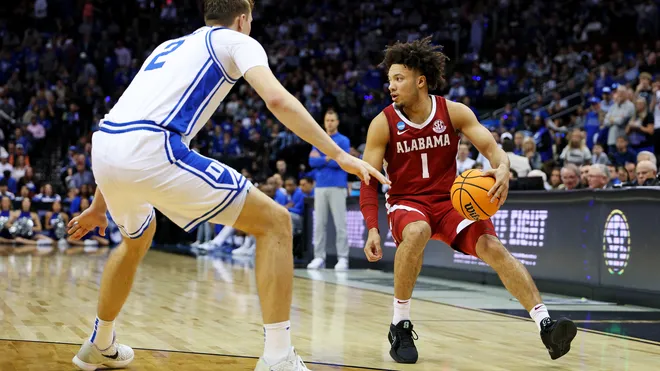Alabama basketball’s loss to Duke in the Elite Eight of the NCAA Tournament was a heartbreaking and frustrating moment for fans, players, and coaches alike. The Crimson Tide entered the game with high hopes, driven by a season of remarkable achievements, but were ultimately outclassed by a team that showcased its strength, composure, and tactical discipline. While the defeat was tough to swallow, it provided several valuable lessons for Alabama, and by extension, any team aiming for success in high-stakes games. Here are three key takeaways from that loss that can be applied to future tournaments.
1. The Importance of Composure Under Pressure
One of the most glaring lessons from Alabama’s loss to Duke was the importance of maintaining composure in high-pressure moments. Throughout the game, Alabama struggled to keep their emotions and game management in check as the stakes grew higher. In contrast, Duke, known for its experienced players and calm leadership under pressure, demonstrated poise when it mattered most.
The Challenge of the Big Stage
The Elite Eight is an unforgiving stage. The magnitude of the game can cause even seasoned players to press too hard or lose focus in key moments. Alabama, which had been dominant throughout much of the tournament, struggled with this. Their offense seemed to stall in key stretches, particularly during the closing moments of the first half and in the early part of the second half. The team appeared to rush shots, and the flow of their offense was disrupted by uncharacteristic turnovers and forced plays.
By contrast, Duke remained patient and disciplined. They controlled the tempo, executing set plays efficiently and waiting for opportunities to come to them rather than forcing the issue. As the pressure mounted, Duke’s players showed maturity, particularly in handling Alabama’s aggressive defense and transition play. The Blue Devils’ ability to absorb pressure, stay calm, and play within their system helped them weather Alabama’s brief runs and ultimately close out the game.
Key Takeaway: Mental toughness and composure are vital in tight tournament games. Alabama’s young roster may have been overexcited and overwhelmed by the moment, whereas Duke’s seasoned players showed the value of staying focused and sticking to the game plan. Moving forward, Alabama must develop greater emotional resilience and learn how to calm down in high-pressure situations, especially as their tournament aspirations continue to grow.
2. Adapting to Opposing Defensive Schemes
Another crucial lesson from Alabama’s loss was their inability to adapt to Duke’s defensive scheme. The Blue Devils are renowned for their physicality and disciplined defensive approach. Alabama struggled to find good shots against Duke’s stifling defense, which disrupted their usual rhythm and forced them into uncomfortable positions.
Defensive Versatility
Duke’s defense was aggressive but calculated. They consistently challenged Alabama’s shooters on the perimeter while clogging the paint and making it difficult for Alabama’s big men to get easy looks. Alabama’s offense, which had been built on a free-flowing, fast-paced system that relies on spacing and high-tempo ball movement, found itself neutralized by Duke’s stout defense. When Alabama attempted to drive to the basket, they were met by well-timed help defense and shot-blocking from Duke’s bigs, especially in the paint.
Additionally, Duke did an excellent job of forcing Alabama into turnovers. The Blue Devils’ length and defensive positioning in the passing lanes made it difficult for Alabama’s guards to get clean looks, and the constant pressure led to rushed decisions and unforced errors. A lack of variety in Alabama’s offensive approach further exacerbated the situation. Instead of adjusting by diversifying their playbook or slowing the tempo, Alabama continued to try to force their usual style of play, which played right into Duke’s hands.
Key Takeaway: In tournament play, adaptability is paramount. While Alabama’s fast-paced, perimeter-oriented offense had carried them to great heights throughout the season, they failed to adjust to Duke’s defensive prowess. Learning to recognize and adapt to opposing defensive strategies will be essential for future success in the tournament. Whether it’s by slowing the game down, spreading the floor more effectively, or using misdirection to confuse defenders, Alabama’s offense needs to evolve to handle different defensive looks.
3. The Value of Depth and Experience in High-Stakes Games
Lastly, Alabama’s loss highlighted the importance of depth and experience in high-stakes matchups. Although the Crimson Tide boasted a talented roster, their depth and experience were not on par with Duke’s seasoned group of players, many of whom had played in multiple NCAA tournaments.
The Duke Experience Advantage
Duke’s roster was a blend of veteran players who had been through the grind of high-pressure games. Their leadership, particularly from upperclassmen, played a pivotal role in keeping the team grounded throughout the game. The experience of playing in the Elite Eight, and in some cases, the Final Four, proved to be invaluable as Duke’s players were able to take control of the game when it was most needed.
On the other hand, Alabama’s roster was young, with several key players experiencing the intensity of the tournament for the first time. While Alabama’s talent and potential were undeniable, the lack of depth and experience showed in moments when the team needed to step up. For example, during critical stretches in the second half, when the game hung in the balance, Alabama seemed to lack the veteran presence to step up and make decisive plays. Instead of executing in the clutch, Alabama appeared to lose its composure, allowing Duke to seize the momentum.



